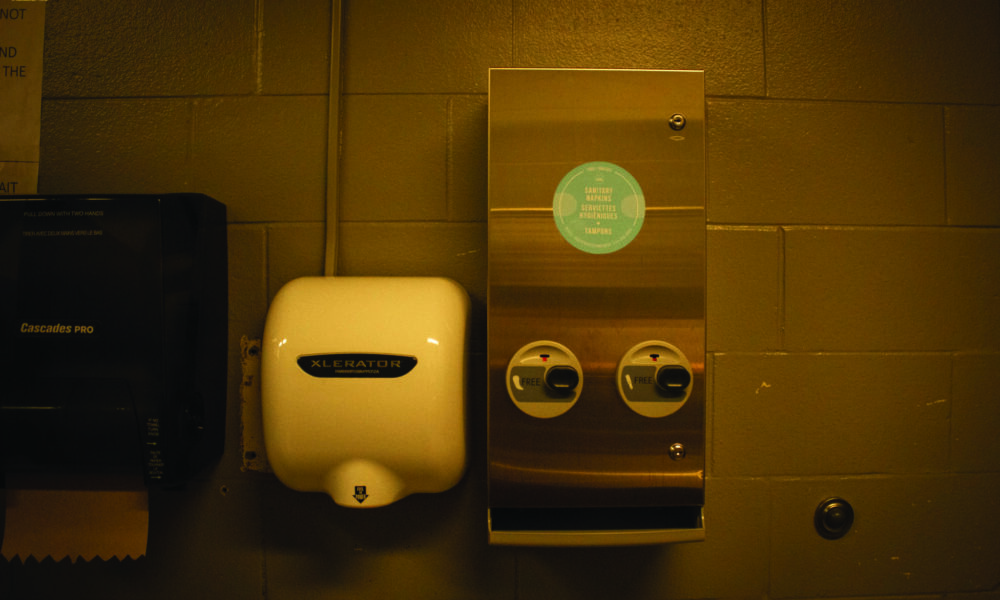The McLennan-Redpath library complex, the Leacock building, and the Bronfman building, among other high-traffic buildings on McGill’s campus, are lacking the menstrual products promised by the Students’ Society of McGill University (SSMU). An investigation conducted by The McGill Tribune the week of Feb. 8 found the majority of dispensers empty—or missing altogether. Of the 10 bathrooms in McLennan that the Tribune checked, all dispensers in the five women’s bathrooms were empty and the five men’s bathrooms had no dispensers.
In 2016, the SSMU passed a motion establishing the SSMU Menstrual Health Products project, an initiative that would provide free menstrual products on campus. The project will run until McGill or Quebec declares the products “necessary goods” upon which menstrual products would be supplied in all washrooms for free.
The non-opt-outable ancillary fee funding the project helps cover the cost of purchasing the products, installing the dispensers, and paying the wages of the project’s part-time SSMU staff—the menstrual health commissioner and two menstrual health coordinators. The student fee that funds the project increased in 2020, jumping from $0.90 to $2.40 per semester to account for greater expenses.
In an interview with The McGill Tribune, SSMU vice-president (VP) University Affairs Claire Downie stated that the project has been on pause since December 2021, which is why the Tribune found that only three out of 22 bathrooms checked on campus had menstrual products. Downie explained the hiatus is due to strict COVID-19 restrictions limiting access to the University Centre, where the project is coordinated.
“We had the planned pause for the winter break and the holiday closure of the SSMU office, so we’ve been on pause for around a month,” Downie later wrote in an email to the Tribune. “The menstrual health staff were offered remote work relating to the SSMU menstrual products policy during the pause.”
Downie called attention to the financial burden of purchasing menstrual products, highlighting the importance of having them widely available on campus.
“There is an additional huge lifetime cost imposed on people who menstruate,” Downie said. “If just a couple dollars every semester for a student can reduce that burden I think that’s a really awesome way to do it. These products should be free and accessible everywhere. If we can be a small part of that on campus, I think it is well worth doing.”
Anaïs Pronovost-Morgan, U3 Arts and co-director of Monthly Dignity, a non-profit tackling period poverty in Montreal, applauded the SSMU initiative. Yet, she also acknowledged that the responsibility of providing menstrual products should fall on institutions, not student leaders.
“This should not be a student initiative, it should be an institutional responsibility,” Pronovost-Morgan said in an interview with the Tribune. “It should be [McGill’s] responsibility to provide toilet paper, soap, and menstrual products in bathrooms [….] It is just as debilitating to not have toilet paper as to not have menstrual products. It is just as uncomfortable and awkward. There are laws that you have to provide toilet paper, it just doesn’t apply to menstrual products.”
McGill media relations officer Claire Loewen informed the Tribune that kiosks at the Student Wellness Hub are supposed to provide menstrual products, but that their operations have been paused since the “earlier days of the pandemic.”
“The Student Wellness Hub has provided students with complimentary menstrual products through health promotion kiosks across Campus since 2018,” Loewen wrote. “We plan to resume this service when we can safely do so. The kiosks began as an initiative to ensure McGill students have access to free health and wellness products to promote healthier living during their studies.”
Acknowledging that the supply of menstrual products on McGill’s campus is “patchy,” Pronovost-Morgan argued that menstrual products should be widely available on campus regardless of the pandemic.
“It is a question of feeling safe and having the products you need, where you need them, and when you need them,” Pronovost-Morgan said. “Having the products available in schools is important because it permits people to live their normal lives, to not be stopped, or to not feel ashamed for forgetting to bring menstrual products with them [….] With issues from supply chains, people need these more than ever. Periods never stop, pandemic or no pandemic.”











Who are the menstrual health staff? What are their specific roles, and how are they fulfilling them remotely? Are my SSMU fees paying said staff? Is the stocking of the dispensers not deemed essential, regardless of COVID?